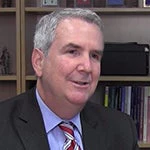Dirk Forrister, CEO and president of the International Emissions Trading Association (IETA), talks about expectations for a 2015 international climate agreement in Paris.
"I think for businesses that have looked at the climate issue, many of them started with a view of kind of discounting that it was going to be a serious issue, but it has grown in acceptance in the business community that it is something real and needs to be dealt with.
And I think looking at the various options of how you can curb emissions — of command and control requirements or tax policy or use of a market — many of them gravitated to the market pricing because they think it will be more accurate in sending the signal about what's needed environmentally.
For IETA members, we view the Paris talks as one of these fundamental moments in time when we're going to get clarity for the future about what type of international climate policy is going to govern for potentially decades to come. So we want it to have references to how markets should be accounted for and how they should be reported and that actually enable more countries to use credible market-based approaches rather than sort of doing nothing or going slow.
Part of the value of a market-based approach is it can stimulate action early. Many of them have shown to deliver more than they were initially thought capable of doing.
Our view is it’s going to be the most effective approach for getting to the level of reductions that are required over the next 20 or 30 years, because the amounts that are commensurate with a 2 degree level of climate protection are enormous. You need a system that's going to really generate action at scale from business, and a market-based approach with a good pricing signal can do that.
Our view is it’s going to be the most effective approach for getting to the level of reductions that are required over the next 20 or 30 years, because the amounts that are commensurate with a 2 degree level of climate protection are enormous. You need a system that's going to really generate action at scale from business, and a market-based approach with a good pricing signal can do that.
So, our ask for Paris is to have the core elements that enable countries to do that, to take strong steps and to work collaboratively rather than in isolated pods that never connect. We want to see linkages between systems, we want to see those linkages inspire more confidence to do more and do it faster and better.
I think Paris is going to be a pretty slim document, so we all ought to get our expectations set right that it's going to be some very principles-based, simple rules that are established. It's not going to be something that forces people to do things. It's going to be something that enables them.
I'm telling my members to think about something that's not 50 pages long, that’s more like 15 or 20 pages long. What you need for markets in that is probably a fairly thin provision that says, if you're doing markets, please report this way: Report what you buy, report what you sell, and never double count. So those fundamental features I think need to be there.
There will also be accompanying this main agreement some side agreements, decisions that operationalize some of the elements, and those are things that will get worked on in the coming years. We'd like the market elements, like an international offsets program, to be elaborated quickly thereafter so that companies can start using them.
Delay is not our friend in this. The sooner you start, the cheaper it will be. So we really want to see negotiators get their job done and accelerate work on those operational pieces."


Join the Conversation